Rigoletto
Giuseppe Verdi
Libretto by Francesco Maria Piave
Opera San José
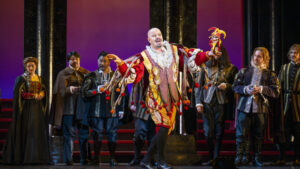
Little wonder it is that from its Vienna premiere in 1851 until the twenty-first century, Giuseppe Verdi’s Rigoletto is one of the world’s most-beloved, most-performed operas. Soaring in music that includes famous, widely recognized arias that are difficult for an audience member not to accompany with at least a hum, Rigoletto sports a captivating story of love and lust, devotion and deceit, revelry and revenge, use and abuse of power – all destined for a tragic, climatic ending. Opera San José stages a grand and glorious, uplifting and heart-wrenching Rigoletto with a cast that to a person combines their absolutely stellar voices with impressively nuanced acting abilities.
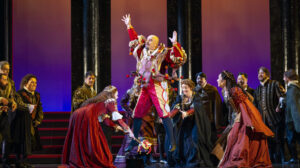
The familiar story constructed in Francesco Maria Piave’s libretto is based on an 1832 play by the French Romanticist, Victor Hugo. The title character is a physically scarred, court jester serving the licentious, womanizing (as well as young and handsome) Duke of Mantua. The Duke surrounds himself not only with beautiful women but also with young, oft-rowdy courtiers who have schemed a plan to kidnap a sequestered maiden from the home of the always pestering, jabbering, and joking Rigoletto – a young girl they think is Rigoletto’s lover. They trick a drunk and blind-folded Rigoletto into aiding their capture of who is actually his own daughter, an innocent beauty who has secretly fallen in love with a poor student while going to her daily mass.
That student is in fact the disguised Duke, to whom the courtiers deliver the night-gowned Gilda, still thinking she is the hated jester’s amor. A seduction by the delighted Duke leads to a pledge of deadly vengeance by the now crazed Rigoletto, who is still also shaken in fear by an earlier curse of a wrongly condemned man, Sparafucile, whom Rigoletto unmercifully mocked as he was sentenced to the gallows by the Duke. “The Curse” – the original title Verdi gave his opera – is a verbal branding Rigoletto cannot escape and leads to events that spiral tragically out of control.
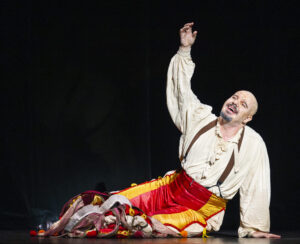
To the lead role of Rigoletto, esteemed and crowd-favorite OSJ former resident artist Eugene Brancoveanu employs with aplomb his highly versatile, hypnotic baritone vocals to convey a wide range of the jester’s emotions. As he taunts the courtiers and entertains the Duke, he sings with spark and sass while kicking up his feet and prancing about in clownish carousing. He mocks with no mercy the condemned Sparafucile, even stealing the old man’s cane and landing him on the floor; but when later Rigoletto is repeatedly worried about the Sparafucile’s curse, his voice palpably trembles in notes full of inner terror as he himself cowers in a ball on the floor. While with ferocious fervor he sings of desired revenge against the Duke, when singing of his love for his daughter, this Rigoletto’s rich voice intones with the deep emotion of a father whose only concern is for her well-being.

With vibrant notes that bounce with energy, tenor Edward Graves quickly reveals to his court and to us the Duke’s views on “feminine charm [that] is a gift bestowed to brighten our lives.” For this Duke, “fidelity” is a “tyrant of the heart.” Rolling, attracting notes become his means of wooing Countess Ceprano (Abigail Bush) and cuckolding her husband (Glenn Healy). When singing as the disguised student, Gaultier Maldè, to Gilda how “the gods of love have tied our fates together,” his ingratiating wooing is supported by beautifully floating, tenor notes that are sure to win her heart. The Duke’s oft-angelic notes that reach heavenly heights in his iconic aria “La donna è mobile” are in great contrast to his true self as a seducing rake who sings of “the woman is fickle, like a feather in the wind.”
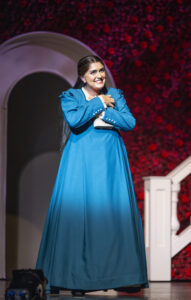
The focus of both Rigoletto’s paternal and the Duke’s scheming love is the secluded, virtuous Gilda who is also anxious to be loved by someone other than just her dear father. Among a much-gifted cast of principals, Melissa Sondhi particularly shines with a soprano voice delicate, golden, and melodic. After welcoming the supposed Gaultier into her home, she sings of “the beloved name which makes my heart beat faster” in notes that trip lightly and joyfully while sliding up and down the musical scale in absolute clarity and ease. As her countenance glows and her eyes gaze longingly, she sings the famous aria “Cara nome,” expressing her evident innocence and idealism regarding romantic love, with each reach to a high-C accomplished with incredible ease and euphony.
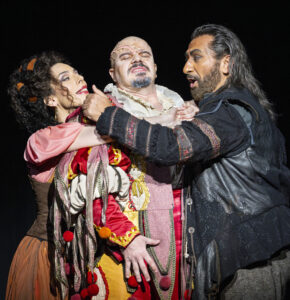
Kudos also go to Ashraf Sewailam as the elderly, condemned Sparafucile and to Philip Skinner as the treacherous assassin-for-hire, Monterone. Sparafucile condemns Rigoletto with a curse sung in deep notes that boom their condemning veracity while Sparacfucile’s bass echoes in cavernous depths as he venomously describes to Rigoletto his skills and means as a killer.
The male chorus of fourteen couriers abound in energy of expression and in excellence of resounding vocals. Their staccato-laced notes sizzle as they sneak toward Rigoletto’s house for their planned kidnapping, harmonies humming with anticipation of their act of devilry. Their off-stage, soft howling as the wind during Act Three’s ominous thunderstorm is nothing short of eerie and even spooky.
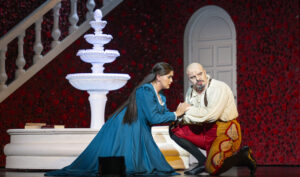
One of the most satisfying aspects of Verdi’s music and of Dan Wallace Miller’s direction of OSJ’s Rigoletto is the various times the principals sing together. A parting duet between Gilda and her supposed-student lover is playfully and romantically enacted, with their sustained interlocking of rollercoaster notes leading to a first kiss. Duets between father and daughter are repeatedly heart-felt and eventually heart-breaking as Rigoletto and Gilda’s voices blend in close and emotion-packed harmonies.
Especially powerful is Act Three’s quartet involving the ardent wooing by a philandering Duke; the laughing and snide reactions of his cocky pursued, Maddalena (Melisa Bonetti Luna); the sad and sobbing Gilda; and the revenge-focused Rigoletto. Each personality and message singles itself while at the same time voices intermingle and blend magnificently.
As wonderful are the songs and story of Rigoletto, a worthwhile evening could easily be spent truly enthralled by just Verdi’s mesmerizing score. That is especially true given the performance of Jorge Parodi in conducting Opera San Jose’s thrilling forty-five-piece orchestra. The somber, brass and drum intonements of the Prelude’s ominous opening that eventually transform into jolly, carnival-like music of the opera’s opening scene are just initial samples of the richly rewarding varieties of musical excellence to come.

Steven C. Kemp’s scenic designs of the Duke’s massive court; Rigoletto’s stair-cased house with its wall of red roses; and the dark and dank, half-destroyed tavern where the story’s final tragedy will play out are each awarded appropriate and stunning lighting designs by Davida Tkach. The costumes designed by Howard Tsvi Kaplan range from the hilarious and colorful, tassel-rich outfit of Rigoletto’s jester to the regal golds and reds of the Duke’s coat to the simple but stunning dress of the young Gilda. Wigs and make-up designed by Christina Martin complete the period-perfect look.
For either the Verdi and Rigoletto aficionado or for the first-timer who maybe has never visited the glorious California Theater to see an Opera San José production, this Rigoletto is nothing short than an invigorating, exciting, must-see evening of opera.
Rating: 5 E, MUST-SEE
A Theatre Eddys Best Bet Production
Rigoletto continues February 23 (7:30 p.m.), February 25 (2 p.m.), March 1 (7:30 p.m.), and March 3 (2 p.m.) in performance by Opera San José at the California Theatre, 345 1st Street, San Jose, CA. Tickets are available online at www.operasj.org; by visiting or calling the box office Monday – Friday 9 a.m. – 5 p.m. at 2149 Paragon Drive, 408-437-4450; or by emailing boxoffice@operasj.org.
Photo Credits: David Allen
